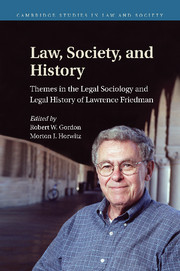Book contents
- Frontmatter
- Contents
- Contributors
- Introduction
- PART I OVERVIEWS AND ASSESSMENTS OF FRIEDMAN'S WORK
- PART II APPLICATIONS OF CONCEPTS, INSIGHTS, AND METHODS IN FRIEDMAN'S WORK
- Legal Culture
- 5 To Influence, Shape, and Globalize
- 6 Exploring Legal Culture
- Total Justice
- PART III THE LEGAL PROFESSION
- PART IV LAW AND LARGE AREAS OF SOCIAL LIFE
- PART V FACTS FROM THE UNDERGROUND: DIGGING LEGAL HISTORY OUT OF THE CELLAR
- PART VI PERSPECTIVES FROM OTHER CONCEPTUAL WORLDS
- Index
- Titles in the series
- References
6 - Exploring Legal Culture
A Few Cautionary Remarks from Comparative Research
Published online by Cambridge University Press: 07 October 2011
- Frontmatter
- Contents
- Contributors
- Introduction
- PART I OVERVIEWS AND ASSESSMENTS OF FRIEDMAN'S WORK
- PART II APPLICATIONS OF CONCEPTS, INSIGHTS, AND METHODS IN FRIEDMAN'S WORK
- Legal Culture
- 5 To Influence, Shape, and Globalize
- 6 Exploring Legal Culture
- Total Justice
- PART III THE LEGAL PROFESSION
- PART IV LAW AND LARGE AREAS OF SOCIAL LIFE
- PART V FACTS FROM THE UNDERGROUND: DIGGING LEGAL HISTORY OUT OF THE CELLAR
- PART VI PERSPECTIVES FROM OTHER CONCEPTUAL WORLDS
- Index
- Titles in the series
- References
Summary
Since Lawrence M. Friedman first published his seminal paper on legal culture in 1969, the number of empirical studies on opinions and attitudes with respect to legal and judicial institutions has been constantly growing. Even if, on the whole, the mass of reliable and comparable opinion data now available worldwide is still relatively thin, in some countries the systematic measurement of both the internal and external legal culture has become a fully consolidated area of research.
It has gradually become accepted that legal culture is an extremely important variable for obtaining a better understanding of how legal systems operate. It is “in a way, the fuel that makes the law machine move and work. It determines the pattern of demands on the legal system. Without the legal culture, ‘law’ is dead, inert, a skeleton, words on paper.”
Legal culture consists basically of values, attitudes, and opinions related to the legal system, and survey research represents a particularly effective operational tool to explore it. Obviously, opinion polls cannot properly and fully capture all the aspects of a legal culture (whether internal or external), but most of its dimensions can only be grasped and measured with the help of surveys. In this sense surveys represent a basic, even if incomplete, instrument in the production of reliable and comparative information.
It is not my intention in this chapter to summarize or even discuss the mass of empirical information already available from research carried out in the United States and in most European Union (EU) countries.
- Type
- Chapter
- Information
- Law, Society, and HistoryThemes in the Legal Sociology and Legal History of Lawrence M. Friedman, pp. 90 - 100Publisher: Cambridge University PressPrint publication year: 2011

